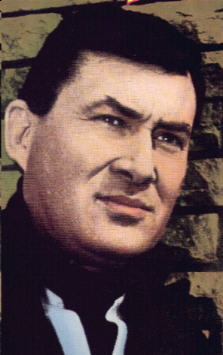|
DON GIBSON (1928 - 2003)
A pioneer of the Nashville Sound
To have devised one enduringly successful song may be no more than serendipity, to have written two implies craft, but to come up, like the country singer Don Gibson, who has died aged 75, with three hugely popular compositions suggests a touch of genius. "I consider myself a songwriter who sings rather than a singer who writes songs", Gibson once said, and he could justify his claim in 10 words: 'Sweet Dreams', 'Oh, Lonesome Me', 'I Can't Stop Loving You'. The first two titles may be best known by lovers of country music but 'I Can't Stop Loving You' is an indisputable standard of popular song, having been recorded more than 700 times, most famously by Ray Charles.
It was not only by his writing that Gibson left his impression on country music. His own 1957 recording of 'Oh, Lonesome Me', produced by Chet Atkins, was one of the first products of what came to be called the Nashville Sound: a strategy of making country music more widely acceptable by removing the musical elements that seemed to stereotype it, primarily the fiddle and the pedal steel guitar, and replacing them with the conventions of mainstream popular music. Atkins and his fellow producer Owen Bradley were the planners behind this subversion, Gibson, Jim Reeves and Patsy Cline its most effective agents. With its plaintive vocal framed by an inoffensive pop arrangement of piano, guitars, rhythm and backing singers, 'Oh, Lonesome Me' shed the homely garments of the genre and donned the bright new clothes of pop music. Further hits such as 'Blue Blue Day', 'Sea Of Heartbreak' and 'Lonesome Number One' confirmed his skill as a crossover artist.
He was born in Shelby, North Carolina, took up the guitar in his teens, and first sang on the local radio station with a group called the Sons Of The Soil. By 1952 he had graduated to station WNOX in Knoxville, Tennessee and to a recording contract. What established him was writing 'Sweet Dreams', a hit in 1956 for Faron Young but now inseparably linked with the name of Patsy Cline, who recorded it seven years later. 'Oh, Lonesome Me' and 'I Can't Stop Loving You' followed in 1957, both written, Gibson claimed, on the same day, June 7. At the time he was living in a Knoxville trailer park and, as he later said, "couldn't have been any closer to the bottom". His fortunes changed abruptly as his record of the first song and Kitty Wells' of the second stormed up the country charts. In 1958 he became a cast member of the Grand Ole Opry.
Gibson went on writing and recording throughout the 1960s and into the 70s, despite having to deal with drug addiction. He had a number one hit in 1972 with 'Woman (Sensuous Woman)'. After his performing career went into decline, his songs continued to earn their way. In 1974, 15 years after Gibson wrote it, Ronnie Milsap topped the country charts with the ironic '(I'd Be) A Legend In My Time', and the following year Emmylou Harris did the same with 'Sweet Dreams'. Gibson was voted into the Nashville Songwriters Hall Of Fame in 1973 and the Country Music Hall Of Fame in 2001. He is survived by his wife Barbara (Bobbi).
Tony Russell - The Guardian
Donald Eugene Gibson, singer and songwriter: born April 3, 1928 - died November 17, 2003.
